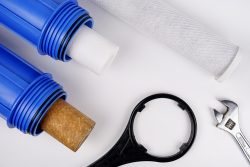What Are Some Contaminants Found In Well Water Filters?
 What Are Some Contaminants Found In Well Water Filters?
What Are Some Contaminants Found In Well Water Filters?
Well water is often considered a safer alternative to hard municipal water supplied by water companies. However, even clean, uncontaminated well water must pass through some sort of water treatment device before becoming potable (safe for drinking and other household purposes). One of the most common and effective types of well water filtration is a mechanical water filtration system, also known as an under-sink water filter.
While a well-designed, properly-installed under-sink filter is very effective at removing potentially harmful contaminants, it does not filter out everything. Here are some common contaminants that are found in well water filters:
Sediment
Sediment is made up of solid particles that settle at the bottom of a container of water or at the bottom of a well. It is one of the most common types of contaminants found in well water filters. Sediment in well water can come from various sources, including soil, rocks, and detritus (dead plant and animal matter). In high concentrations, sediment can cause water to look cloudy, discolored, or foul-smelling. Sediment can also clog up the filters and reduce the efficiency of the well water system.
Iron
Iron is a naturally occurring metallic element that is found in soil, rocks, and water. Iron concentrations in well water can be high enough to turn water rust-colored, stain clothes and appliances, and produce sulfuric or metallic smells. High levels of iron in drinking water can lead to health problems such as gastrointestinal distress, low iron absorption anemia, and other iron-related diseases.
Manganese
Manganese is another metallic element that is found in soil, rocks, and water. Like iron, it can cause water to turn rust-colored, smell unpleasant, and leave stains on clothes and other surfaces. Manganese can also affect the taste of water, making it unappealing for drinking, cooking, and other household purposes. High levels of manganese can cause health problems similar to high levels of iron.
Chlorine
Chlorine is a powerful disinfectant that is added to water by many public and private water suppliers to kill harmful bacteria and other microbes. While chlorine is effective at eliminating pathogens, it can also produce unpleasant smells, tastes, and side effects in some people. Chlorine has been linked to increased risk of cancer, heart disease, and other chronic illnesses.
Pesticides and Herbicides
Pesticides and herbicides are chemicals that are used in agricultural and commercial settings to kill insects, weeds, and other pests. These chemicals can easily find their way into the groundwater supply, where they can be difficult to filter out. Ingesting high levels of pesticides and herbicides can cause a range of health problems, including respiratory and nervous system disorders, cancer, and reproductive problems.
Bacteria and Viruses
Bacteria and viruses are microscopic organisms that can be found in untreated well water. These pathogens can cause a range of illnesses, from mild gastrointestinal upset to life-threatening infections. While mechanical well water filters can remove many types of bacteria and viruses, they are not 100% effective. It is important to have well water tested regularly to ensure that bacteria and viruses are not present at unsafe levels.
Final Thoughts
Under-sink well water filtration systems are an excellent option for homeowners who want to ensure that their well water is safe and potable. While these filters are effective at removing most contaminants, they cannot filter out everything. Homeowners should have their well water tested regularly to ensure that the levels of potentially harmful contaminants are below safe limits. It is also important to choose a well water filter that is appropriate for the specific contaminants present in your well water supply. By staying informed and taking steps to protect their water supply, homeowners can keep their families safe and healthy.
Got questions about your water filtration system? Let us help! Contact us today to learn more about what we can do for you!
Categorised in: Well Water Testing
